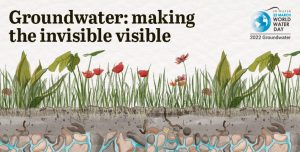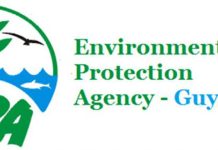“Thousands have lived without love, not one without water” – W.H Auden
Water is essential to life on Earth – clean and potable water is essential to health and productivity. Fortunately, Guyana is rich in water resources. Most of the population and economic base of the country is concentrated in the low-lying coastal plain, much of which is below sea level. This year, as Water Day is celebrated on March 22 as in every year, it brings to our attention issues and solutions related to freshwater resources. ‘GROUNDWATER – making the invisible visible’ was chosen as this year’s theme, and raises awareness to the hidden water resource that has always been critically important but not fully recognised in sustainable development policymaking.
In Guyana, groundwater from the coastal aquifer system provides about 90% of the domestic water for our country. As such, we can clearly see the importance of water, specifically groundwater as a whole.
At the Environmental Protection Agency (EPA), we are well aware that groundwater is one of the nation’s most important natural resources. As such, the Water Quality Unit within the Technical Services Department is responsible for ensuring that developers, especially those with operations that have direct discharge into our waterways, are conducting their operations in an environmentally-friendly manner. Those developers are required to submit bi-annual, annual, or, for some operations, monthly water-quality testing results from a reputable laboratory in Guyana. Failure to comply with such a condition can result in stringent charges, provided in the Water Quality Regulations 2000. Mining operators are required to have a catchment basin before water is discharged into the waterways, because groundwater can exert negative influences on mining economics by creating risks for operational continuity and miners’ safety, as well as having adverse environmental impacts. So, the mining operators always need to be in high compliance when it comes to water quality. Since groundwater is the most accessed source of freshwater around the world, including for drinking, irrigation, and manufacturing, it is our duty to make sure that, as citizens, we do everything in our power to keep our surrounding waterways clean and safe.
How can we protect and conserve groundwater?
1. Reduce chemical use;
2. Manage our waste, especially by making compost, which helps to reduce moisture loss in plants and reduces the amount of water they need;
3. Don’t leave our taps running;
4. Fix the drip if any of our pipes has a leakage, and report major leaks or pipe breakage to GWI; and
5. Wash smarter by choosing phosphate-free laundry detergents, as phosphate aids in plant growth, which chokes our waterways and affects water quality.
To celebrate World Water Day, the EPA will be coordinating and participating in several awareness activities, including:
• Webinar on Restoring Groundwater hosted by UNEP-WCMC – https://www.youtube.com/watch?v=5cBUgpN3x30&ab_channel=UNEP-WCMC
• Exhibition hosted by Guyana Water Inc. on Tuesday March 22, Cultural Center Tarmac from 10:00h
• Media engagement – radio and television interviews
References
https://www.unwater.org/world-water-day-2022-groundwater/
http://www.epa.gov/superfund/students/clas_act/haz-ed/ff_05.htm
http://www.epa.gov/superfund/students/wastsite/grndwatr.htm\
https://www.sam.usace.army.mil/Portals/46/docs/military/engineering/docs/WRA/Guyana/Guyana%20WRA.pdf











